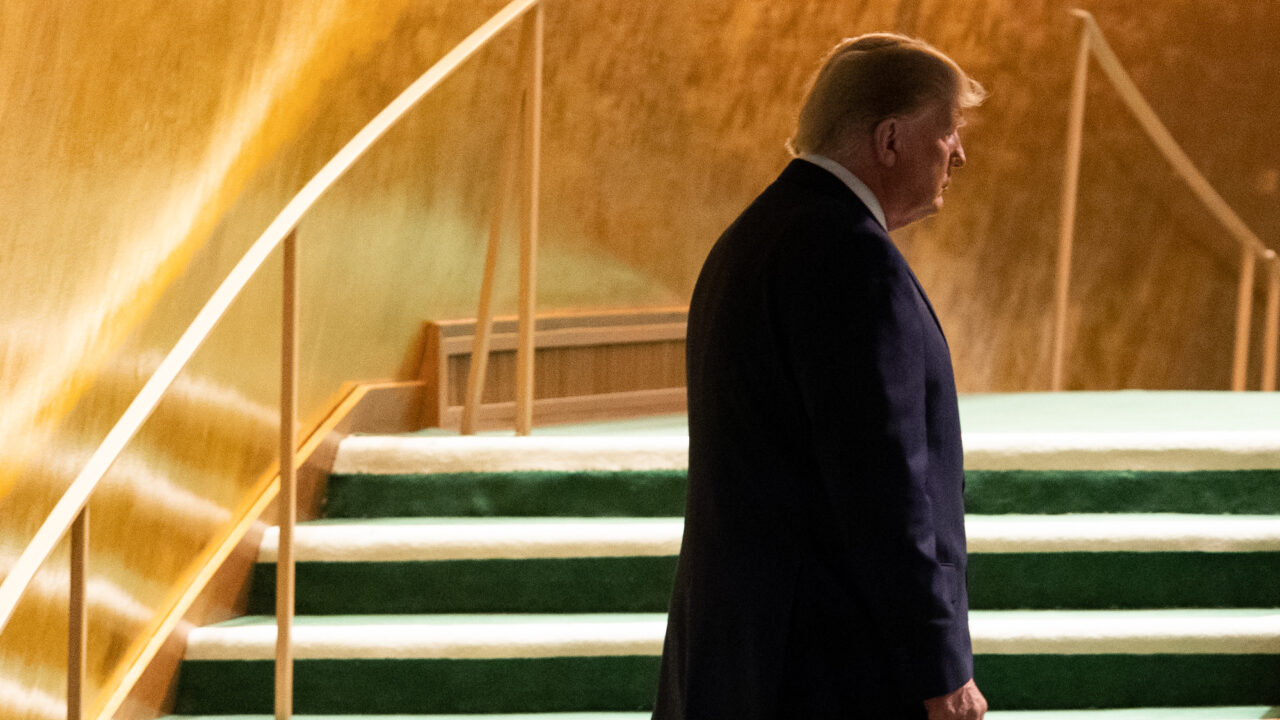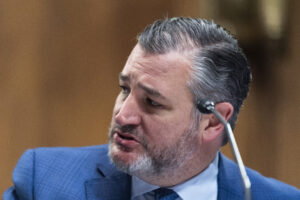Beyond the Indictment
Rescuing American Democracy requires more than prosecuting Donald Trump. Trump arrives at the United Nations Headquarters in New York City. Photo by Andrea Hanks / Public Domain
Trump arrives at the United Nations Headquarters in New York City. Photo by Andrea Hanks / Public Domain
Donald Trump is the first American president to be indicted. No matter where you see yourself on the political spectrum, that is a very big deal.
Although the initial criminal case against Trump is being handled by Manhattan District Attorney Alvin Bragg for what some see as relatively minor business-fraud crimes committed in connection with the payment of hush money to a porn star, it won’t be the last. By late spring or early summer, the ex-president will likely be charged with more consequential offenses in Georgia and in federal court for plotting to overturn the results of the 2020 election; inciting the Jan. 6 insurrection; and absconding to Mar-a-Lago with a trove of top-secret documents. While Trump will be shielded with the presumption of innocence as the wheels of justice turn, the available public evidence suggests he is in serious jeopardy of being convicted of multiple state and federal felonies.
Trump also faces liability in two pivotal civil trials in New York. A defamation/rape lawsuit brought by writer E. Jean Carroll is currently underway. In addition, Trump is slated to go on trial in October in a massive fraud case brought by New York Attorney General Letitia James.
But even as we anticipate the sweet sound of jury verdicts read in open court, we would do well to reflect on the broader implications of prosecuting Trump for the future of American democracy. There are, on close analysis, both obvious benefits and inherent limitations to what can be achieved through litigation.
While Trump will be shielded with the presumption of innocence as the wheels of justice turn, the available public evidence suggests he is in serious jeopardy of being convicted of multiple state and federal felonies.
On the positive side, there can be no question of the need to hold Trump accountable for abusing women, grifting his way to the Oval Office in 2016 and, more critically, for his attempts to cling to power after losing the 2020 campaign by more than 7 million votes. We have all heard the cliché that “no one is above the law,” but prosecuting Trump has given the adage new life and content.
There is no good reason to accord Trump, now a private citizen, the kind of legal immunity that the Justice Department unfortunately decided, as a matter of discretionary policy, to afford Richard Nixon and Bill Clinton when they were sitting presidents. Other democracies around the world, including France, Germany and Portugal, have prosecuted their political leaders for corruption with no enduring ill effects. There should be no room for American exceptionalism when it comes to our own leaders.
At the same time, we should be under no illusions that taking Trump down will cure all that ails our democracy. Trump is the head of the Republican Party and a political movement that has morphed into a form of 21st-century fascism. Prosecuting Trump, and even sending him to prison, will not extinguish the movement he unleashed.
Fascism, as I have written before, is an emotionally loaded and often misused term, but it is as real today — as a political and cultural force, as a set of core beliefs and mode of governance — as it was when Benito Mussolini founded the Italian Fascist Party in 1919 and declared himself dictator six years later. It is on the rise once more across the globe in the Philippines, India, Western Europe, Russia and here at home.
Many instructive discussions of fascism can be found in the works of scholars such as Ruth Ben-Ghiat, Timothy Snyder, Jason Stanely and Henry Giroux. Of all the definitions of the term, perhaps the most incisive appears in Robert Paxton’s classic study “The Anatomy of Fascism” (Harvard University Press, 2004). “Fascism,” Paxton writes,
may be defined as a form of political behavior marked by obsessive preoccupation with community decline, humiliation or victimhood and by compensatory cults of unity, energy, and purity, in which a mass-based party of committed nationalist militants, working in uneasy but effective collaboration with traditional elites, abandons democratic liberties and pursues with redemptive violence and without ethical or legal restraints goals of internal cleansing and external expansion.
After hesitating to call Trump a fascist when he initially took office, Paxton changed his views after Jan. 6. “I resisted for a long time applying the fascist label to Donald J. Trump,” he wrote in Newsweek, “[But] Trump’s incitement of the invasion of the Capitol…removes my objection to the fascist label. His open encouragement of civic violence to overturn an election crosse[d] a red line. The label now seems not just acceptable but necessary.”
Giroux offered even more powerful observations in an essay, “Fascist Politics in the Age of Neoliberal Capitalism,” cross-posted earlier this month by CounterPunch and LA Progressive:
An upgraded form of fascism with its rabid nativism and hatred of racial mixing is currently at the center of politics in the United States. Traditional liberal values of equality, social justice, dissent and freedom are now considered a threat to a Republican Party supportive of staggering levels of inequality, white Christian nationalism and racial purity.
It is by no means clear that the U.S. can withstand the existential threat posed by the upgraded form of fascism we face today. Combating fascism requires a coordinated and concerted political response. To quote Giroux again:
Confronting this fascist counter-revolutionary movement necessitates creating a new language and the building of a mass social movement in order to construct empowering terrains of education, politics, justice, culture and power that challenge existing systems of white supremacy, white nationalism, manufactured ignorance and economic oppression.
Seen in this light, the effort to bring Donald Trump to justice is the beginning of a much longer struggle, not the end.
Your support matters…Independent journalism is under threat and overshadowed by heavily funded mainstream media.
You can help level the playing field. Become a member.
Your tax-deductible contribution keeps us digging beneath the headlines to give you thought-provoking, investigative reporting and analysis that unearths what's really happening- without compromise.
Give today to support our courageous, independent journalists.









You need to be a supporter to comment.
There are currently no responses to this article.
Be the first to respond.